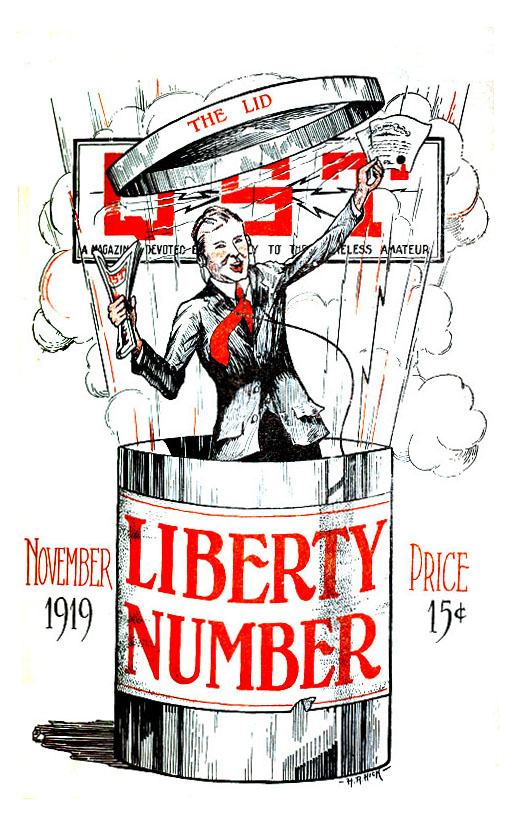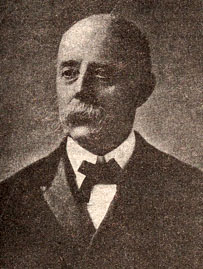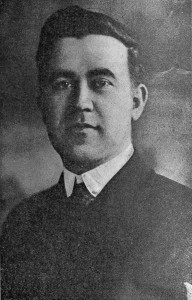1912 antedating
I couldn't find an origin but did find a slight
antedating of the 1919 letter.
The Railroad Telegrapher in
1912 printed a humorous poem/prayer. Here's an extract:
And if some "Ham" who sounds insane,
Should move me to say things profane
O stay my hand upon the key
And may I not get "H" for "P."
May I refrain to ope my door
And kick through it some tedious bore.
Who brings to me his half-wit kid
To be transformed into a lid.
A slight variation appears in Telephony of 1913, which gives
us the full text and quotes around jargon terms, and a
source:
Help ! Help !
Poetry will out, sometimes in the most unexpected
places and occasionally from unusual sources, says the
Los Angeles (Cal.) Times. One of the latest devotees of
the muse and one who has been creating considerable
comment around the Alexandria is little Miss Vivian
Ewing, Postal Telegraph operator in the hotel. After
months of viccisitudes and troubles caused principally
by the patrons of the little station in the marble
corridor, Miss Ewing evolved the following prayer to
assist her through her hours of toil:
Help me this day, O, Lord, to be
Kind and gentle with my key.
Help me earn my wage this day
And tempt me not to ask more pay;
And if some man who sounds insane
Should move me to hot things profane,
O stay my hand upon the key
And may I not make "H" for "P".
May I refrain to open my door
And kick through it a weary bore
Who brings to me his darling “kid”
To be transformed into a “lid”.
And may I gently treat the cranks
Who, after spoiling twenty blanks,
Fold up a lot of callow slush
And sternly bid me, “send it rush".
And when the clock points five to eight,
O, help me then to calmly wait
While some proud dad leans on the booth
And wires baby has a tooth.
In short, pray make me what I ain't,
An understudy of a saint,
That I may hold this job of mine
Till time gives me the "30" sign.
C. A. Shock, of Sherman, Texas, sent this to TELEPHONY
with the suggestion that variations might be rung on it
to make it apply to the telephone operator. So, “potes,"
sharpen pencils and have at it!
These are from snippets, so the years could be wrong, but
it appears to have been reprinted in other magazines
published between 1912-1914.
Lid operator
A lid operator, or lid, was
originally a novice operator, rather than any poor
operator.
Some quotations:
Telegraph Workers Journal,
1924:
Did you see Joe McKenua's lid? Some
plush. Bill Hartley is still ...
QST, 1925:
The "lid" operator can be told very
quickly when he makes a mistake. He does not use a
definite "error" signal but usually betrays himself by
sending a string of dots. The good operator sends "I ?"
after his mistakes and starts sending again with ...
QST, 1927:
When you have traffic and want to get it off, DO NOT
give it to a "lid" operator. If you
do, the chances are that It will die right there. Many
times I have become QSO with several stations in one
direction, with the intention of QSRlng, only to find
...
QST, 1928:
We plead guilty to "getting quite a kick out of"
operating our radio phone sets. The idea seems to
prevail that no one except a "ham", a "lid" or
a rank beginner even fools with phone.
Unfortunately this is true to some extent but there are
old ...
And:
... I flatter myself that I have become more than just
a lid operator. I hold a commercial
license, am an ORS and have made a fair showing in
traffic, and to you, OM, I owe a great part of my
success. You were my first schedule and I have tried to
...
And:
... gave several humorous anecdotes of his first trip
as a "lid" commercial operator on the
Great Lakes.
Telegraph Workers Journal,
1930:
Can it be a New Year's resolution, and that he is
starting at the bottom like an inexperienced
"lid"? Two nasty accidents occurred in "Mu"
since the advent of the New Year. Andy and Archie fell
off the booze-wagon. Nothing serious happened ...
However, Popular Science (1933) quoted
in the question is all about trade jargon, and includes an
English translation of "Telegrapher's Lingo". The full
description is of a novice, but specifically translates lid
as poor, showing the meaning is changing:
He uses a bug, but it runs away with him. As a sender
he's a lid.
...
Translated, this queer language means:
He uses a semi-automatic key, but keeps it adjusted at
a speed greater than that at which he can manipulate it
properly. As a sender of messages he is poor.
It goes on to praise him for being able to receive at the
fastest speeds and for never interrupting. (It also
explains what "30" means, as mentioned in the 1919 poem.)
Sitting on the lid
This may be unrelated, but I'll include it on the off
chance. The Railroad Telegrapher included
reports of union members' work situation ("In 1920, there were 78,134
telegraphers on all railroads represented by The Order of
Railroad Telegraphers. Membership in the union had
peaked."). Some of these would include the phrase "is
sitting on the lid". Here are some examples.
From the preceding 1913 Telephony:
I. S. Johnson and Leo Smiddy are working extra there,
while Bro. Bob Fountaine sits on the lid.
The Railroad Telegrapher in
1911:
Bros. Packard, Wilson and Nickel sat on the
lid while Bro. Hook attended the TOI'0.'ll0
[?] convention and took a trip through the East. He was
relieved by Bro. _l. L. Druley, from the \'abash [?].
And here:
... rear brakeman on the division correspondent's
motorcycle for several miles. I introduced him to the
high and low crossings at a speed of 30 miles per, when
we stopped he had both legs wrapped around the gas tank,
and was settin' on his lid.
And here:
Mr. John Dalzell, Chairman of the Rules Committee, sat
stubbornly "on the lid" and refused to budge.
He believes that free trade in labor is the safest
bulwark of tariff protection for employers.
The Railroad Telegrapher, 1914
(date verified):
Two operators taken off at Merino, making it a one-man
station, with Bro. Johnson on the lid.
Bro. Doherty to second Brighton, bumping Bro. Baker to
second Carr, vice Bro. Seeley bumping Bro. Rotenbaum;
Dent nights to the extra list.
I'm not entirely clear what this sitting on the lid
refers to, but for the work reports, I get the impression
it's similar to sitting on the bench, being held
as reserve.
One of these is not a work report but a political report:
"Mr. John Dalzell, Chairman of the Rules Committee, sat
stubbornly "on the lid" and refused to budge."
This has a political meaning, according to A
Desk-Book of Errors in English (1906, 1920) by
Frank Horace Vizetelly:
lid: A slang term for cover, hat,
etc., used especially in the phrases keeping
the lid down, sitting on the lid, political
colloquialisms for closing up places of business, as
pool-rooms, saloons, etc., or keeping a political
situation in control.
This fits for the stubborn chairman of the rules
committee, and speculating, perhaps this "keeping control"
sense was applied to reserve workers patiently waiting
their turn. Or perhaps the union work reports are telling
us those workers were taking care of union business and
keeping their local situation in control.
In any case, the political phrase "sitting on the lid"
originated or was at least popularised by President
Theodore Roosevelt when describing Secretary of War, William
Howard Taft:
Taft as Secretary of War became the administration's
"trouble shooter" at home and abroad. During the years
between 1904 and 1908 Taft had direct charge of the
construction of the Panama Canal. Roosevelt considered
Taft one of his most valuable assets, so able was Taft
that Roosevelt felt free to leave the capital whenever
he wished, because he had "left Taft sitting on
the lid." As Roosevelt's personal emissary
Taft was sent on many diplomatic assignments.
The New York Times, April
1905:
It was suggested to the president that things would go
along in a smooth manner, even if he was absent.
Oh, things will be all right," he said. "I have left Taft
sitting on the lid keeping down the Santo
Domingo matter."
Roosevelt commented in a May 1905 letter to his son:
Yes, I have been much amused with the cartoons about my
remarking that I had "left Taft sitting on the
lid". Some of the cartoons about the bear and
wolf hunting have been really funny.
A The Evening News of 1922
commented:
This phrase went around the country at the time, and
the fact that Mr. Taft's physical weight was such that
we all had a feeling that if he were sitting on
the lid, the lid must be geld down pretty
firmly, undoubtedly had much to do with the success of
the great phrase-maker's remark at that time.
More speculation: "sitting on the lid" was a metaphor for
"sitting on a hat" meaning "keeping control" and the
meaning passed to "sitting as a reserve on the bench".
Operators sitting in reserve are often novice operators,
or "lid operators". A lid operator was then originally a
novice worker, and as novice workers would make more
mistakes, the meaning then changed to refer to any poor
operator.
 Finally,
nearly one year after the armistice, a breakthrough: A single,
tacked-on page, after the end cover of October QST, a hastily
added special announcement proclaimed: “BAN OFF! THE JOB IS
DONE AND THE A.R.R.L. DID IT. See next QST for details”
Finally,
nearly one year after the armistice, a breakthrough: A single,
tacked-on page, after the end cover of October QST, a hastily
added special announcement proclaimed: “BAN OFF! THE JOB IS
DONE AND THE A.R.R.L. DID IT. See next QST for details”


